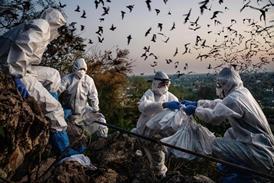The world premieres of a selection of new Australian films put this year's Adelaide Film Festival (AFF) firmly on the international map. Six of these features were part-funded by the festival itself, and four of these in particular were responsible for much of the buzz.
These were Sarah Watt's My Year Without Sex, which opened the festival, and Granaz Moussavi's Iranian-Australian collaboration My Tehran For Sale, which were both in competition. Warwick Thornton's Samson & Delilah screened out of competition and won the audience prize, while Glendyn Ivin's Last Ride was a hit with the critics.
Adelaide is a modest festival but a bold one. It was the first Australian event to introduce an international competition (Sydney has done so since), and the first to invest directly in film production (Melbourne has followed suit).
'We're curating a slate,' says AFF director Katrina Sedgwick of the aim of the Adelaide Festival Film Investment Fund (AFFIF). 'We're looking for creative teams with distinctive voices, and a breadth of form, tone, structure and themes. We're interested in the independent sector and the artist with something to say, not looking at the films in terms of commercial prospects or finding audiences.'
The state government of South Australia (SA) provides the fund with $656,000 (A$1m) per biennial festival and is administered by the AFF board and director; the festival costs an additional $1.5m (A$2.2m) to stage.
To be eligible for investment, a project must be Australian and world premiere at the AFF (or even the Festival of the Arts as Ten Canoes did in 2006, although this is unlikely to happen again). Film-makers need a well-advanced project to convince AFF that it will be finished in time for the upcoming event (Ten Canoes missed that deadline). Beyond that, there are no rules, though preference is given to films produced or post-produced in SA, using local personnel or delivering economic gains to the state.
The fund generally invests $130,000 (A$200,000) in each project or 10% of the budget, whichever is less, up to $330,000 (A$500,000). To date, the AFF has spent $1.8m (A$2.7m) on 31 projects, including 11 features. Recoupment and profits back to AFF are along usual investor lines.
The fund's investment can be enhanced by additional backing from the South Australia Film Commission (SAFC), which chose to back four of the six 2009 features. The creative team on Last Ride says it did not consider shooting in South Australia until it realised that, with additional Safc investment, the state could provide $280,000 (A$450,000) of the $2.6m (A$4m) budget.
Film-makers can contact Sedgwick informally, or her deputy Adele Hann, at any time. The AFF pair also seek out film-makers, approaching Samson & Delilah producer Kath Shelper after being impressed by Thornton's short Nana. Australian feature film-making activity is relatively easy to track, with no more than 35 made annually.
Sedgwick makes recommendations to the board - and there is no onerous contracting. Film-makers love the simplicity and speed (the paperwork required by Melbourne is a problem, they say) and point out that Sedgwick provides invaluable creative support. Others talk of her matchmaking skills: convincing further investors to come on board or getting film-makers together.
'We are an enabler,' Sedgwick explains. 'Being an energetic partner, often at the very difficult early stage, helps trigger other finance.'
Sedgwick is renowned for her flexibility - her $65,700 (A$100,000) to fill the gap in the $1.1m (A$1.6m) Samson & Delilah was in the form of a distribution guarantee.
In February, during the AFF, South Australia also hosted the Australian International Documentary Conference, the National Screenwriters' Conference and the board meetings of two major national organisations, Screen Australia and AusFilm. It was not coincidental: the huge marketing effort meant the profile of the festival and the state soared.
'The money must come unfettered,' Sedgwick warns anyone with plans to set up a similar fund. 'You have to have curatorial freedom and not be bound by government. You also have to be lean and mean - keep bureaucracy to an absolute minimum.'






















No comments yet